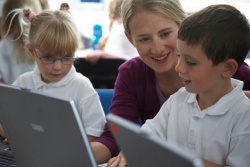 Pennsylvania’s cyber students now have a school library to call their own.
Pennsylvania’s cyber students now have a school library to call their own.
Opening its virtual doors on September 4, the library serves the 10,500 K-12 children who attend the Pennsylvania Cyber Charter School (PA Cyber). Students can check out ebooks, conduct research through free databases for school assignments, and get print materials snail-mailed to their home with a click of the button.
Several years in the making, the cyber library has already counted 50,000 page views and mailed out 200 books. The 5,000 individuals logging in have searched for titles from The Adventures of Tom Sawyer to The Iliad, and current titles including “Harry Potter” (Scholastic) and the “Diary of a Wimpy Kid” (Abrams) series are on order, says Sandra Fouch, PA Cyber’s director of federal programs, assessment and research, who oversees the library from her base in Midland, Pa.
“We have a lot of students who don’t live close enough to utilize their public library or maybe don’t have transportation available to them,” says Fouch. “We wanted to provide those resources to all students and even the playing field as far as having access to library resources.”
PA Cyber opened in 2000 with 500 students across Pennsylvania. Enrolled children must reside in the state and attend classes full-time. Students may either sign up for self-paced classes, in which they get assignments, file work, and are graded, or virtual classes, which meet at a set time. In these, students can write on a virtual blackboard, raise their hands with questions, and interact with a live teacher.
Initial costs to launch the library came in at about $55,000, with funds largely coming from federal Title 1 money, says Fouch. This year, PA Cyber staff members are piloting the library along with their regular duties. But Fouch says the school hopes to raise funds to hire a full-time librarian.
Things are running smoothly so far. In addition to checking out books, students can log into EBSCOhost, a database that searches magazine, newspapers, image resources, and other primary source materials for school assignments. Videos are available to help families with school questions, and a resource center fields queries related to technology. Teachers assign ebooks for class, and the library hopes to eventually add audio books, Fouch says.
In the meantime, the library is having no problem getting kids to return physical books. “It hasn’t been an issue so far,” says Fouch. “We tell them to send it back when they’re finished. And so far, so good.”

